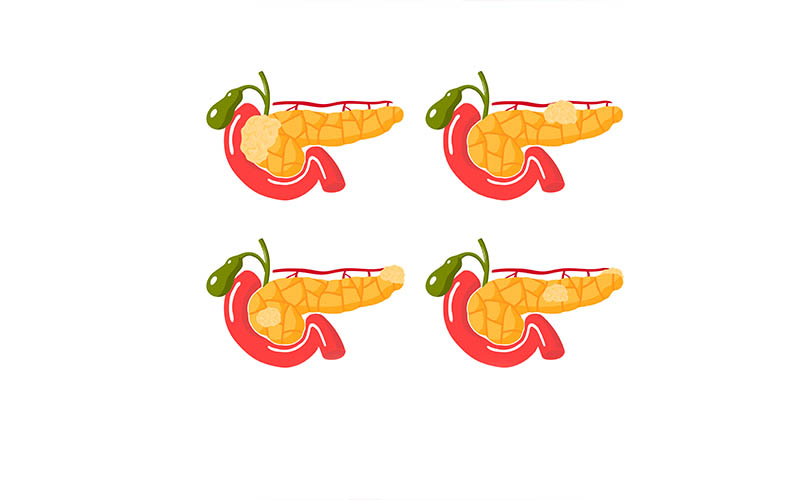Pancreatic cancer ranks fourth in the list of the deadliest cancers worldwide. We can say that both diagnosis and treatment are very difficult. Although medical technology has advanced tremendously today, since a 100% effective drug has not been developed yet, surgical methods are preferred for treatment. Early diagnosis is extremely important in this type of cancer, which is more common over the age of 60. Pancreatic cancer is one of the types of cancer that spreads very quickly. If the diagnosis is made in the early period, very successful results can be obtained by applying whipple surgery. We will consider all these issues in more detail. However, there is a subject that everyone should know first; let’s talk about the symptoms of pancreatic cancer.
What are the Symptoms of Pancreatic Cancer?
We can say that this cancer does not show many symptoms in the early stages. When symptoms occur, the tumor begins to spread outside the pancreas. Therefore, the period of early diagnosis has passed. We can list the symptoms of pancreatic cancer as follows:
- Intermittent nausea and vomiting
- Loss of appetite
- Weight loss
- Extremely slow development of jaundice
- Obstruction and pain at the stomach out
- Having a light ablution
- Back pain
- Abdominal pain that increases when moving to a horizontal position after meals
- Gas pain
- Swelling
- Dark or bloody urine
- Weakness
- Itching
- Arrival
- Enlargement of the liver or gallbladder
In addition to all these, we can list the less common symptoms of pancreatic cancer as follows:
- Diarrhea
- Diabetes
- Depression
A doctor should be consulted as soon as these symptoms are felt. Because as we mentioned before, early diagnosis is vital in this cancer.
Types of Pancreatic Cancer
Resectable type of pancreatic cancer is suitable for surgical intervention and therefore the patient can be operated. In this type of cancer, the tumor must be removed. Therefore, we can say that surgical intervention is the only solution method. However, even if the tumor is removed, there is a possibility of recurrence of the cancer. Chemotherapy is applied after the surgery and it is possible to delay the recurrence of the cancer for up to 6 months.
In locally advanced pancreatic cancer, spread to blood vessels and tissues around the tumor may have occurred. However, this type of cancer does not spread to the surrounding organs. It is not a type of cancer suitable for surgical intervention. The blocked bile ducts are opened and the small intestine can also be intervened.
In the metastatic type of cancer, the cancer has spread to a wide area. Intra-abdominal, liver, lung, bones and brain may spread. Only radiotherapy and surgery, is not enough for treatment. Therefore, chemotherapy is required. Chemotherapy treatment prolongs the life expectancy of patients. The type of pancreatic cancer called relapse is a recurrent type. After the surgery, the cancer recurs in the same area.
Neuroendocrine pancreatic cancer is also considered in two different groups. These;
- Resectable
- Anresectable
While resectable is a type of cancer suitable for surgical intervention, it is not suitable for unresectable surgery.
How is pancreatic cancer treated?

Treatment of pancreatic cancer basically consists of 3 different methods. These are; surgery, radiotherapy and chemotherapy. We can say that the treatment is applied together by doctors who are specialized in fields such as gastroenterology, surgery, medical oncology, radiation oncology. The important thing here is to determine whether the patient is a suitable candidate for surgical intervention. Because we can say that most of the patients are not suitable candidates for surgery due to early cancer spread to distant organs or widespread local involvement. Therefore, treatments are applied to these patients to ensure that they have a more comfortable period. Pancreatic cancer surgery is one of the most difficult and problematic operations. Performing the operation by an experienced surgeon is also of great importance in terms of future complications.
What is Pancreatic Inflammation?
Inflammation occurs as a result of damage to a part of the body. Damage to the pancreas and subsequent inflammation of the pancreatic gland is called pancreatitis . Symptoms of pancreatic inflammation can be examined in 2 groups.
Symptoms of Acute Pancreatic Inflammation
- Moderate or severe abdominal pain that may radiate to the back
- Sudden onset of pain
- Swelling and tenderness in the abdomen
- Nausea and vomiting
- High fever
- Rapid heartbeat
- Worsening of pain while eating
Symptoms of Chronic Pancreatic Inflammation

In the case of chronic pancreatic inflammation, symptoms very similar to the acute one can develop. At the same time, we can say that the following symptoms may accompany these symptoms:
- Persistent pain radiating to the back from time to time
- Unexplained weight loss
- Having oil droplets in the stool
- Frothy diarrhea
- High blood sugar
What Causes Pancreatic Inflammation?
Of course, patients may also wonder why this problem occurs. A lot of research has been done on this disease so far. These studies specifically point to gallstones and excessive alcohol consumption. We can say that pancreatic inflammation is much more common in people who drink excessively or have had gallstone problems. However, other causes were also identified in studies. We can list these reasons as follows:
- Use of certain drugs
- High blood fat level
- Some infections
- Injuries to the abdomen
- Metabolic disorders such as diabetes
- Certain genetic disorders, such as cystic fibrosis
These conditions can trigger the problem of pancreatitis. Of course, this inflammation can also occur in those who have not experienced the problems listed above. However, it should be noted that there are more common problems in those who have experienced these problems. Therefore, those in this group should definitely not disrupt their regular doctor check-ups.
How Does Pancreatic Inflammation Dry?
When pancreatic inflammation is diagnosed, the patient should be intervened in the earliest possible period. Because if this condition is not treated, it can also pose a life risk. Digestive problems should be reduced within the scope of treatment. Indigestion must be prevented and enzymes must be restored to function. However, the patient loses a lot of fluid during the intervention process. Therefore, it is necessary to make a liquid supplement. The patient may also need to eat a small amount of food or be fed only with liquid foods. Tissues damaged by inflammation may also need to be surgically removed. Medication is also used to relieve the patient’s pain complaints . Calcium and vitamin supplements should also be given to the patient. If there are stones in the gallbladder, they may need to be surgically removed.
Who Gets Pancreatitis ?
We can say that some people have a higher risk of developing this disease. We can also cite these people as a short list:
- Men
- People with a family history of pancreatitis
- Those who have had gallstone problems
- Those with a family history of gallstone problems
- Those with obesity problems
- Those with high triglycerides
- Those with diabetes
- Smokers
- Those who drink excessive amounts of alcohol
It is much more important for those who have the problems listed above to have their pancreas checked regularly. You can write all your questions about the subject in the comment section.
 AR
AR

